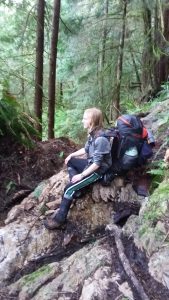
Page, Connor. “Pausing on the West Coast Trail.” 2020. JPEG.
Hello, and welcome. My name is Connor, and I’m happy to be joining you for an exploration of Canadian literature. This concept of “Canadian literature” is no doubt one that we will scrutinize before long. What, after all, is “national” or “Canadian” about the verbal artefacts under consideration? How do they express, forge, or contest a tradition or an identity? And what values are here implied by “literature” and the “literary,” by the written word and lettered learning?
In ENGL 372, we will likely puzzle over these and other questions, considering the intersections between Western and Indigenous storytelling traditions, literature and orature, myth-making and nation-building, narrative and identity.
First, though, a story:
Some years ago, I and some family members set out to hike the West Coast Trail, a 75-km trek along the coast of Vancouver Island. Parks Canada describes (and markets) the trail as a route of overlapping stories, of Huuay-aht, Ditidaht, and Pacheedaht habitation and, later, the shipwrecks, survivals and rescues of colonists (have a look at Parks Canada‘s account here). We began hiking the day the trail opened for the season (May 1st) and experienced it in all its muddy glory.
By the time we reached Nitinaht Narrows my uncle was having serious troubles with his knees, and we made the decision to abandon our hike and leave about half the trail unwalked. The way to do this was to get passage with the Ditidaht ferryman across Nitinaht Lake to the Malachan reserve, from which point he would drive us to where we’d left our car.
After crossing the lake by motorboat, we crammed into the back of the ferryman’s pickup. We bounced for hours over pothole-ridden logging roads. Along the way, he kept up a continuous stream of storytelling, and we heard about communal canoe journeys, gatherings, ceremonies. This was not the story I expected when I began the trail–a story of detour, turning aside, incompletion, unforeseen encounters.
Last year, I read Dylan Robinson’s recent book Hungry Listening: Resonant Theory for Indigenous Sound Studies (here is an informative interview with Robinson about his book). In discussing perceptual attitudes within the context of colonization, Robinson also thematizes a certain turning aside. To him, “hungry listening” is a paradigmatic settler/colonial positionality, a programme of consumptive, appropriative, assimilating perception (50). His argument spoke powerfully to my background as a music student and to my history as a lifelong non-Indigenous inhabitant of Indigenous lands. What, Robinson asks, are the ethical and political implications of the very ways we listen, see, read, and create, access and circulate knowledge? What relationships do our perceptions form with the land and its co-inhabitants?
The important thing, perhaps, is that hungry listening, with effort and awareness, can be critiqued, slowed, blocked, distracted, and turned in other directions. So my hope in this course and its reading is to be open to delay and distraction, to surprises and challenges, to old and new stories. I look forward to attempting this in your good company.
Works Cited
D’Souza, Aruna and Dylan Robinson. “Hungry Listening: A Conversation Between Aruna D’Souza and Dylan Robinson.” Independent Curators INTL, Vimeo, https://vimeo.com/465553646. Accessed 15 January 2020.
Robinson, Dylan. Hungry Listening: Resonant Theory for Indigenous Sound Studies. University of Minnesota Press. 2020.
“West Coast Trail: Hike of a Lifetime.” Parks Canada, https://www.pc.gc.ca/en/pn-np/bc/pacificrim/activ/SCO-WCT. Accessed 15 January 2021.